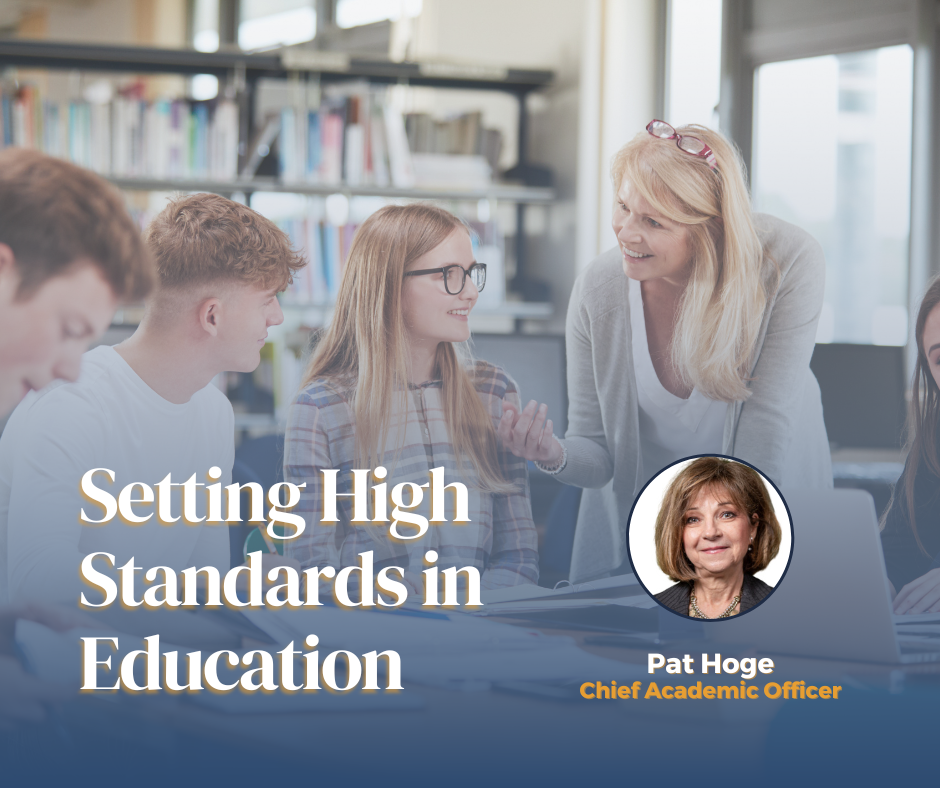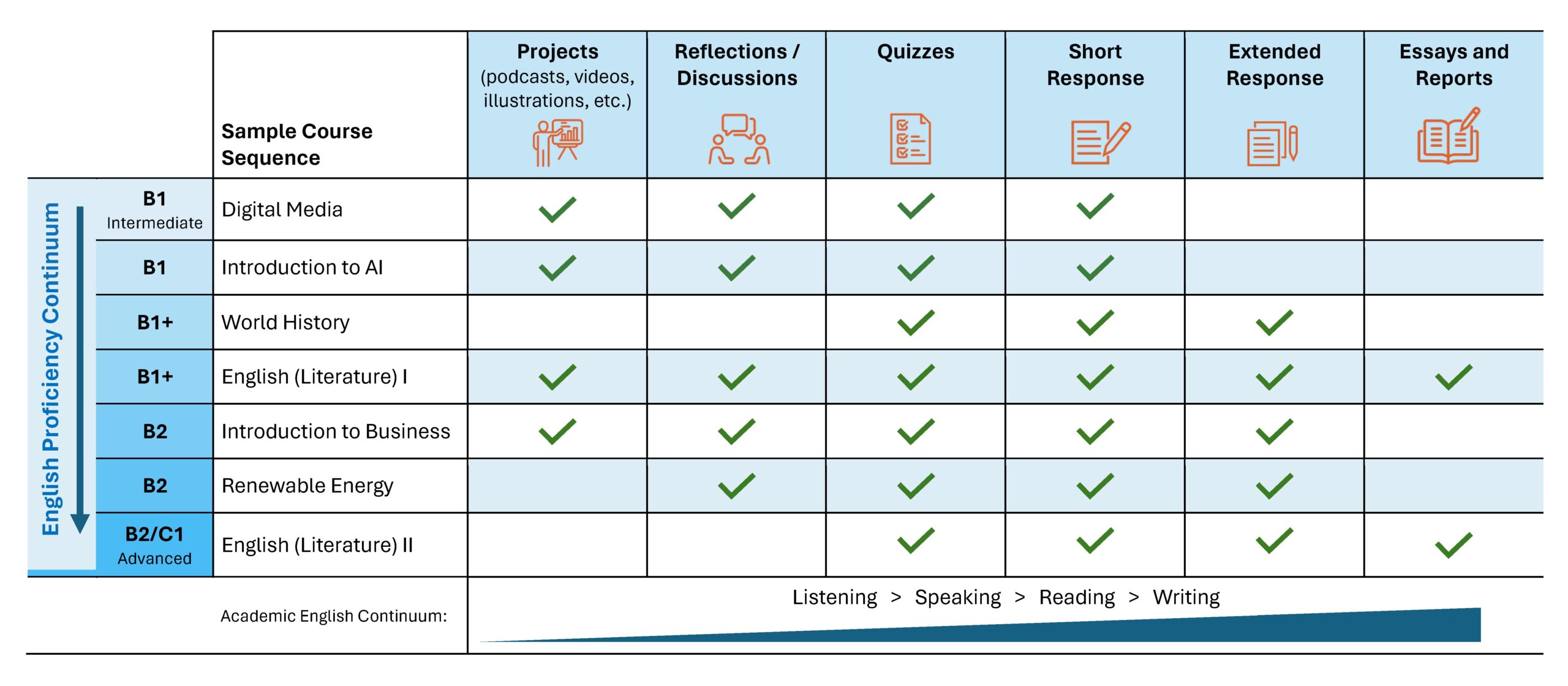Setting High Standards in Education—For Our Team and Students

At Hudson Global Scholars, the academic success of our students is paramount. We ensure success by adhering to rigorous performance and curriculum standards, working with prestigious accreditation organizations, and implementing research-based academic policies that influence all teaching and course content.
“The student is the center of our pedagogical philosophy,” says Dr. Patricia D. Hoge, a respected digital education leader who serves as Chief Academic Officer at Hudson Global Scholars. “No matter the skill or topic we teach, we always start with the learner. We want to make sure the learner is engaged and that there is evidence that learning is taking place.”
Dr. Hoge started her career at one of the top public school systems in the U.S., and she has worked for some of the world’s most innovative and cutting-edge online and hybrid learning startups. She has a deep knowledge of curriculum development and is an expert in language acquisition and reading.
For her, there are no shortcuts when it comes to academic excellence. She oversees Hudson Global Scholars’s academic accreditation, the proper application of educational policies, teacher training and professional learning, curriculum development, and teaching and learning. She also ensures curriculum provided by academic partners meets the highest standards.
Curriculum that Fosters University Success
This attention to quality has been especially critical for the U.S. Dual Diploma program since universities turn to Hudson Global Scholars to deliver well-prepared international students to their campuses.
“We are thoughtful about the curriculum we use in our programs,” says Hoge. “Whether it comes from us or a partner, it has to support our students in their journey, whether that’s to get a U.S. high school diploma or to go on to study on an American university campus.”
One of the distinctive features of the Dual Diploma program is its meticulously designed course sequencing, strategically structured to foster English language proficiency across all aspects of communication. Beginning with foundational courses emphasizing listening and speaking skills, students progressively advance to history and literature classes demanding higher levels of reading and writing proficiency. This approach not only builds confidence but also ensures that upon graduation, students possess the requisite linguistic abilities for active participation in university class discussions and proficient essay composition—an essential skill set for success in American higher education.
When developing their U.S. Dual Diploma program, Dr. Hoge considered the listening, speaking, reading, and writing skills required in course activities as well as the English proficiency needed. With a gradual increase across both of these continuums, students more effectively develop their English language skills and are more successful academically.
Expert Online Teaching
Dr. Hoge and her team meet with teachers monthly for virtual “Teacher Talks” to discuss new online teaching and instructional strategies. There’s also regular observations of teachers to ensure they use the correct tools and techniques to engage and support students. Teachers are required to grade all work and provide feedback to students within 24 hours of an assignment’s due date, and Dr. Hoge and the training and teacher management teams are constantly checking to be sure this is happening.
Teacher recruitment is especially important at Hudson Global Scholars. Teachers must have a bachelor’s degree or higher, and they must be able to demonstrate that they have adequate expertise in the academic area that they are teaching. Hudson Global Scholars recruits teachers from across the U.S. and seeks out those with the flexibility to work in the early morning or late evening to accommodate the schedules of students who live in many different time zones.
“We have a great teacher recruiting team that is very experienced when hiring new teachers,” says Dr. Hoge. “Before we bring on a new teacher, we need to be sure they are a great fit for online teaching and learning and are for working with our wide range of domestic and international students. Hudson Global Scholars teachers have the unique opportunity to engage with students with varied cultures and experiences and introduce them to our U.S. instructional methodologies and practices.”
In some cultures, students are not encouraged to speak up in the classroom, or they are expected to take copious notes and not interact with classmates. At Hudson Global Scholars, teachers work with students, especially those who want to attend an American university, to understand the interactive and collaborative dynamics of the U.S. classroom and what U.S. professors will expect of students who enroll in their courses. “Our teachers play a big role in preparing students for the next step, especially if the next step is entering a bachelor’s degree program in North America,” says Dr. Hoge.
Dedication to Continuous Improvement
Accreditation is crucial to maintaining high standards, and at Hudson Global Scholars, it also means continuous improvement in everything we do. Our education services are reviewed and accredited every six years by a team of educational experts from Cognia, an accreditation and certification organization with 125 years of experience. Hudson received its first accreditation from Cognia in 2020, and continues to work with the organization to improve learner well-being.
“It is up to us to ensure that we never let up on quality assurance monitoring,” says Dr. Hoge. “Our students and their families depend on us to get it right, and we take our promise to them very seriously.”
Questions & Answers with Dr. Hoge
Q: How can a parent be sure their child will learn with Hudson?
A: Our teachers are trained to continuously monitor and support student learning, and to validate student’s learning in many ways. There is not one test, but many small assessments, or check-ins, to ensure the student is engaged, learning, and retaining the information. Students must show teachers that they understand the skills and concepts and do this throughout the course, not just at the end.
Q: What do you enjoy most about your job at Hudson Global Scholars?
A: I feel very privileged to be working in education now because the ways we teach and engage students in learning are evolving every day. I’m lucky to be able to help move education forward and to use data analysis to pinpoint teaching and learning techniques that are most effective in leading to student success. Just the other day, I participated in a video conference with a chief learning officer of a school group in Kazakhstan, and it was a fascinating exchange. It’s such a wonderful part of this role to engage with educational leaders around the world and work together to support students in their educational journey.
Q: Is Hudson’s curriculum tailored to non-native English speakers? How do you track comprehension and English language proficiency?
A: Our curriculum is designed for English language learners as it supports these second language learners in the areas most essential to learning and applying English in an academic setting. This is particularly evident in our U.S. Dual Diploma program. With a structured progression of English difficulty, the program begins with simpler English requirements in early assignments. By the end of the program, students progress to coursework requiring advanced language skills, such as reading literature, and writing academic essays. This mirrors the academic rigor students will encounter in a U.S. university setting. Through this sequential approach, students build confidence and proficiency in English language skills essential for university success.
Q: How do your teachers support non-native English?
A: All Hudson Global Scholars teachers are trained to work with non-native speakers, so they know how best to support these students in increasing their overall English proficiency and their knowledge of academic English. Teachers encourage students to practice their English in ways that expand their vocabulary, build their comprehension, and increase their speaking and writing fluency and proficiency. By progressively challenging students with increasingly complex linguistic tasks, we ensure that they are well-equipped to thrive in the demanding academic environment of English-speaking universities.
Q: What do you say to people who aren’t sold on online learning?
A: We know that many students, teachers, and families did not have the best experience with the online learning they experienced during the pandemic. Unfortunately, that experience did not provide students with a well-designed, well-delivered online learning experience. A well-designed online classroom can provide such a rich, engaging, and flexible learning environment for students that can be customized to their unique needs, interests, and abilities. We often say that in the traditional classroom, time is consistent, and learning is variable. We flip that at Hudson Global Scholars so that learning is consistent. The goal is for students to master a skill or concept, and if that takes one hour or two hours, it’s the student’s success that matters most.


Recent Comments